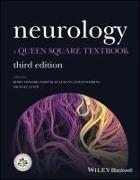Neurology
BücherAngebote / Angebote:
A fully updated and authoritative neurology resource The Queen Square Textbook has established itself as a favourite companion to clinical neurosciences training and teaching around the world, whilst retaining its role as an invaluable reference guide for physicians and other healthcare professionals working in neurology, general medicine and related specialties. The book continues to reflect the core values essential to the practice of clinical neurology in the 21st-century. The third edition has been extensively revised and updated to take account of the rapid pace of progress in the neurosciences and patient care. Contemporary neurology has been changed by the COVID-19 pandemic, the climate emergency and the growing inequalities in healthcare resources. The new edition has been extensively revised to reflect these challenges and affords a greater emphasis on management and rehabilitation whilst continuing to reflect the coherence of a text produced from a single, closely-knit, centre of excellence. Highlights of the new edition include: An updated approach to clinical examination, decision-making and diagnosis New developments in neuroimmunology, pathology and genetics Reflections on the history of our specialty, how the 'neurology method' has evolved and why this remains relevant to contemporary practice. Neuropalliative care Ethical and legal issues in clinical neurology The future direction of research in the neuroscience and clinical neurology The latest developments in the understanding and management of stroke, movement disorders, epilepsy, cognitive impairment, multiple sclerosis, infections, myelopathy, anterior horn cell disease, disorders of nerve and muscle, neuro-oncology, neurological disorders of hearing, balance and vision and the neurological care of critical illness, sleep, neuropsychiatry, pain, autonomic and urological disorders. An emphasis on treatment and rehabilitation of the person with a neurological diseaseThe new edition marks a significant transition to reflect contemporary neurological practice during uncertain times. It mirrors the enormous changes in investigation, diagnosis and treatment that have occurred in recent years whilst maintaining the underlying principle that we do not treat diagnoses but, rather, we care for people affected by neurological disease.
Erscheint im April




